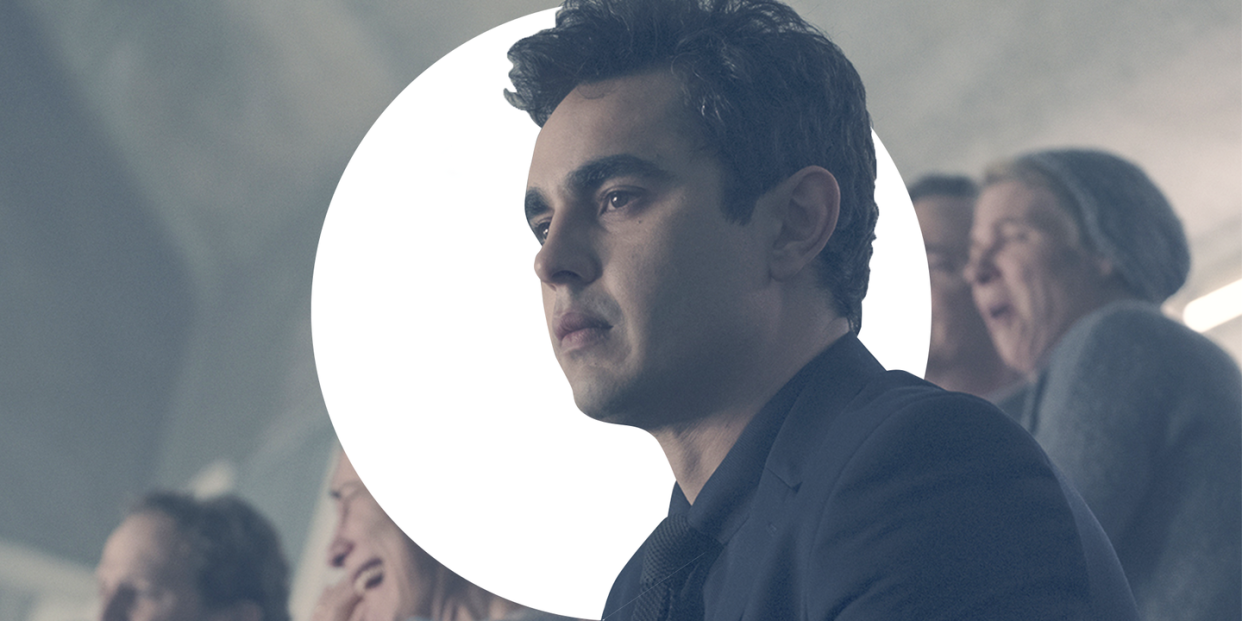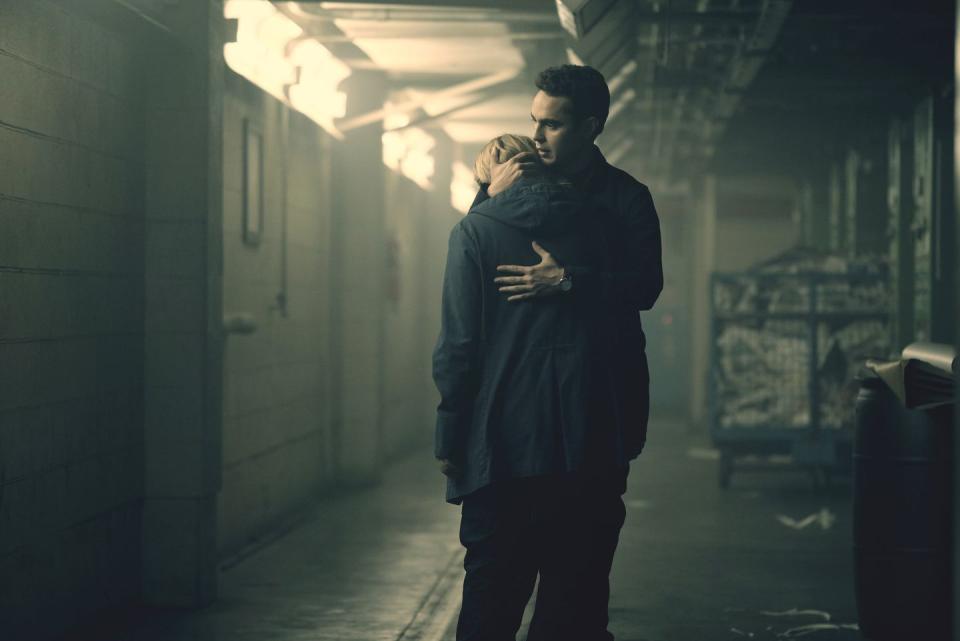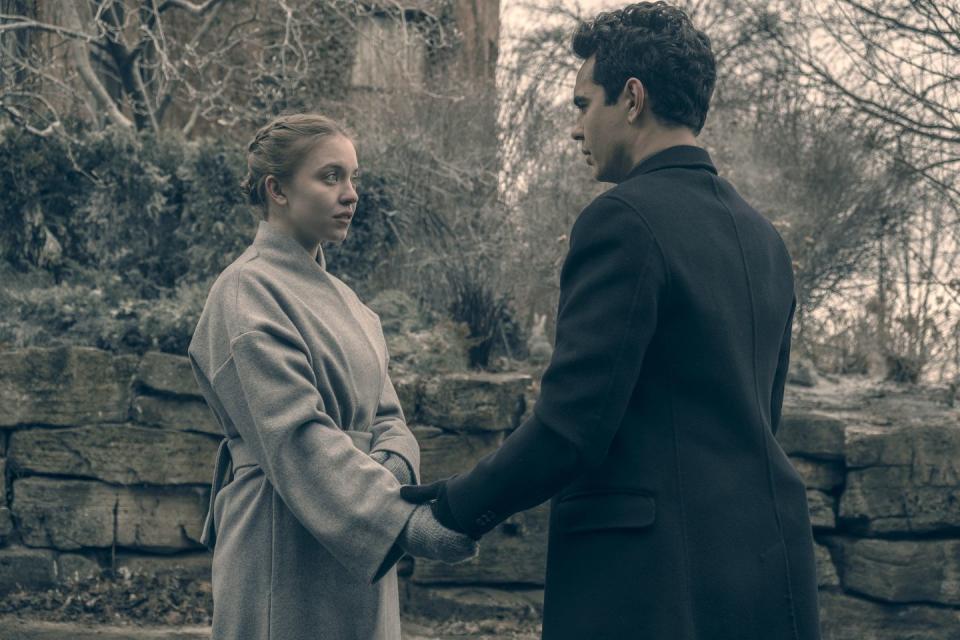Max Minghella Is the Only Good Man in Gilead

There are not many good men in Gilead. There aren’t even many men in Gilead about whom you might reasonably feel conflicted; the misgoynist dystopia at the heart of The Handmaid’s Tale is populated by sociopathic Commanders and power-crazed Guardians whose every worst impulse is fostered by the society in which they live. But Max Minghella’s Nick is the exception. Though seemingly a loyal employee to the Waterfords and an effective agent of Gilead, it becomes clear by the end of Season 1 that Nick’s stoical exterior belies a rebellious spirit, and that his love for June (Elisabeth Moss) is very, very real.
Season 2 has pushed Nick's unflappability to its limits: following the news that June is pregnant with his child, he conspires to get her out of Gilead and comes painfully close to succeeding. His effort to undermine his monstrous boss, Fred Waterford (Joseph Fiennes), is thwarted by a bombing. Most unexpectedly of all, the regime "rewards" Nick for his service by giving him a 15-year-old bride, Eden (Sydney Sweeney), whose presence leaves him truly unsettled. And in this week's episode, "Postpartum," Nick's stilted dynamic with Eden takes a tragic turn; having tried and failed to find any love in her marriage, Eden has fallen for another man, Isaac, and when her affair is discovered, she is executed.
BAZAAR.com sat down with Minghella to discuss shooting June and Nick’s intense sex scenes, that devastating turn in Episode 12, and why Season 2 has felt so much darker to him than Season 1.
Harper's BAZAAR: I’m still not really over Nick and Luke [O. T. Fagbenle] meeting for the first time in Episode 9. Was that scene as intense to shoot as it was to watch?
Max Minghella: There was definitely a lot of anticipation about that scene on the creative side, and Lizzie [Moss] herself was really involved in how it played out. For me, it was so much fun to finally work with O. T.! This is a funny show, because we all get along so well but most of us haven’t spent much time together. We all work in these little segregated groups, and I work almost exclusively with Lizzie [Moss] and occasionally with Yvonne [Strahovski] and Joe [Fiennes]. What was thrilling about the Canada episode was finally getting to engage with these other parts of the world. O. T. and I are very different people, which is smart casting because Nick and Luke are also wildly different. It’s a smart dichotomy with these two men, which I think reflects two sides of June.
HB: So Elisabeth Moss was involved with developing that scene?
MM: Yeah, she’s very involved in everything. People obviously know that she stars in the show, but I don’t think people realize how much she really produces the show. It's far from a vanity credit, she really is our day-to-day producer, and is very, very much involved in the scripts and the edits. But she cared in particular about that scene, and I think as a fan of the show herself she wanted to make sure it really played out right.
HB: I was very suspicious of Nick throughout Season 1, and even now it’s sometimes unclear how involved he is with the resistance versus Gilead. What is his deal?
MM: What I love about playing Nick is that he’s someone who is always lying, to a degree. But I’m very defensive of him because I play him, so I’ve never had those suspicions about his moral compass. I love that he is a very romantic character-I’m a very romantic person in real life, so that's something I like tapping into and channeling. In this show, which is so often bleak and difficult, Nick’s a part of the narrative that is hopefully cathartic. When I go to set in the morning to shoot a scene with Lizzie, I always feel like it’s nice to be bringing something slightly less intense for a few hours, slightly less dark.

HB: Speaking of cathartic, June and Nick’s sex scene at the Boston Globe offices was so striking and passionate, and to me took their relationship to a different level of intimacy. How do you approach working on a scene like that?
MM: Our director on that episode, Mike Barker, is an amazing character and super charismatic, and he’s also a master of sex! He’s famous for doing sex scenes, not just on our show but on many others. He’s so good at it because he doesn’t beat around the bush-no pun intended-and he’s very straightforward, almost comically so. Nothing about it feels precious, but he’s also not a lascivious person at all, and he’s always incredibly focused on storytelling and character. He’s always the first person to try and cut a sex scene, and he has cut many of them before. He really only wants them to be there if they serve the story in some valuable way, and do something that can’t be achieved in any other way. And with that scene, the fact that Lizzie and I had already had a whole season together made it easy to be very straightforward. The scenes are not uncomfortable to shoot at all, and I've done sex scenes in other things where that’s not the case.
HB: The dynamic between Nick and Eden throughout the season has been deeply awkward, and he seems to really struggle to be kind to her, when it comes so naturally to him in other situations. Why do you think that is?
MM: I think Nick’s a person who’s pretty good at clearing hurdles and dealing with obstacles, and navigating tricky situations. And I think Eden is the first time that he has not known how to navigate something. I think he’s almost dumbfounded by it, and doesn’t anticipate it, and so when it happens he’s on the back foot and he’s trying to catch up, and that’s very foreign to him. He’s just out of his depth. So it was fun for me playing this person who’s generally so proficient, as somebody who’s suddenly kind of helpless and almost petulant in this situation he can’t control.

"There’s something really devastating for Nick about his inability to persuade Eden to play the game and get out of there alive."
HB: And Eden’s storyline culminates in this incredibly tragic ending, where her affair with Isaac is discovered and she’s executed for refusing to repent.
MM: Yeah, and there’s something really devastating for Nick about his inability to persuade Eden to just play the game and get out of there alive. Her piousness makes it impossible. I remember [her drowning] being a horrible scene to shoot. It’s rare that the darkness of the show envelops the set-it’s normally quite a playful set even when we’re shooting dark shit, but that drowning scene was really devastating for all of us. There weren’t many fake tears. And the challenge with playing Nick, because he gives very little away, is always figuring out how to play someone who’s repressing emotion, without repressing his emotions from the audience.
HB: When June tries to reach out to Nick after what happens, he rebuffs her. Should we be worried about their relationship, now that they both have this guilt over what happened to Eden?
MM: I think that there's always gonna be very complicated moments between these people, and there have been throughout Season 2. There was definitely a time when I think Offred was fed up with Nick, and in these moments of tragedy, sometimes we need privacy. I think it's no more complicated than that, and I don't think this is a giant hurdle in their relationship, I think it's just a hiccup.
"That drowning scene was really devastating for all of us. There weren’t many fake tears."
HB: Nick’s loyalty to the Waterfords seemed unshakable last season, but in Season 2 it’s clear he has real disdain at least for Fred. How far does his loyalty go?
MM: I think it's really tricky with those guys. I’ve always likened it in my head to family, like, even if your relative is a serial killer, they’re still your relative. I think the fact that Nick and the Waterfords have lived together for so long, and he specifically has been treated very well by them, makes it complicated, especially with Serena. Yvonne and I talk all the time about how we can insinuate a compassion between us, and a sort of gentleness, even though I obviously deep down believe that they’re horrible people. There’s a trust between Nick and Serena, and I think he’s sympathetic to her to a degree.
In general, Season 2 has been a lot more emotional for me as a viewer, and I think it’s because when we made the first season, we were just anticipating this administration. The election happened midway through shooting, and the show aired so early on in the presidency that Season 1 still played for me as a kind of hypothetical doomsday scenario. Whereas Season 2 for me plays as a reflection of an actual situation. I mean, everything with Alexis [Bledel]’s character in Episode 2-I sobbed, watching that, and found it deeply painful in the same way I found that scene with June and Hannah to be painful. It just takes on a whole new resonance when you know that this is real, as opposed to potentially real.
A new episode of The Handmaid's Tale premieres every Wednesday on Hulu.
You Might Also Like